Mike Pinder 1941-2024
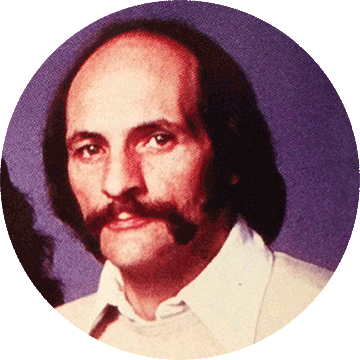
Remembering a Magnificent Moody
It is with deep regret that I write this tribute regarding Moody Blues founding member Mike Pinder who passed away on April 24, 2024 at age 82. Mike was the last surviving original member of this world famous group who were formed in Birmingham during the early 1960s and was part of the band's "classic" lineup for more than a decade.
Michael Thomas Pinder who was born December 27, 1941 grew up in the Erdington area of Birmingham. While still a young boy at school he developed a keen interest in astronomy and space travel, drawing and building rocket models. This led to teasing from his class mates who would call him "Mickey the Moon Boy". But he also learned to play piano and guitar. An early memory that stuck with Mike was seeing American film star Jimmy Durante on TV performing 'I'm The Guy Who Found The Lost Chord'.
Mike became an occasional member of popular local group "El Riot and The Rebels" fronted by vocalist Ray Thomas whose childhood friend John Lodge also played bass guitar in the band. Mike played piano in the line-up but his day job was at the Streetly Electronics factory owned by the Bradley brothers who manufactured a revolutionary keyboard instrument called "The Mellotron". This association would eventually change the course of Mike's life and professional music career.
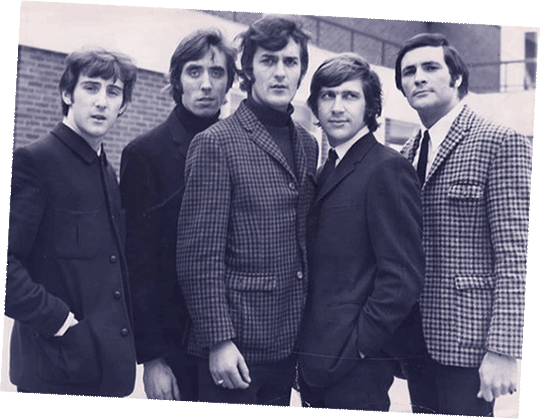
Concerning the Birmingham music scene at the time, Mike Pinder recalled; "There was a music store in town where everyone met on Saturdays. Most of those who were in bands worked regular jobs during the week so 'Semi-pro' was the banner we all worked under. There was always this comeraderie and friendliness between bands. We would often end up playing on the same bill at the different ballrooms and clubs around the city."
It was Mike Pinder and Ray Thomas who helped form "The Moody Blues Five" early in 1964 following a chance meeting with Denny Laine in Birmingham. Ray and Mike had recently returned from Germany where they performed in a group called "The Crew Kats" at some of the same venues The Beatles had performed at before they found fame. Denny at that time was fronting "The Diplomats" but was already rehearsing with a new line-up that included drummer Graeme Edge and bass guitarist Clint Warwick. (photo shows the first Moody Blues line-up left to right; Denny, Clint, Ray, Graeme, and Mike).
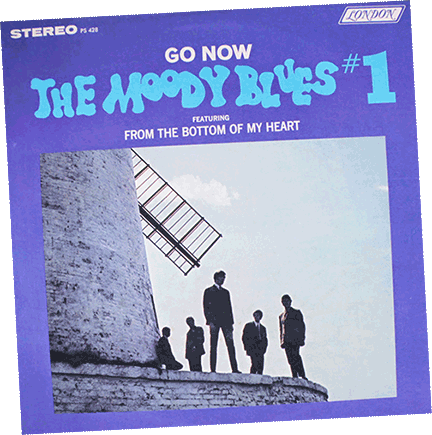
Mike Pinder came up with the name "Moody Blues" from a Duke Ellington record he liked titled 'Mood Indigo'. A proposed sponsorship deal with the local Mitchells & Butlers brewing company had failed to happen although the new band were already using the name "M&B Five" and so "Moody" was combined with "Blues" as that was the type of music the band were performing at the time.
I've already written much on The Moody Blues for this website so do read their story via the links provided here, but it's worth mentioning the group were the first from Birmingham to have an international hit record when their million selling recording of 'Go Now' reached the top of the UK pop charts in 1964. That record was notable for Mike Pinder's descending piano introduction and Denny Laine's mournful lead vocal performance that combined with a group vocal backing to give the band their distinctive sound.
"We only got paid about 50 pounds each for that record." said Mike. "One day, we phoned our management company and discovered the phone was disconnected. We went down to their office and it was closed and locked up. They'd taken everything!"
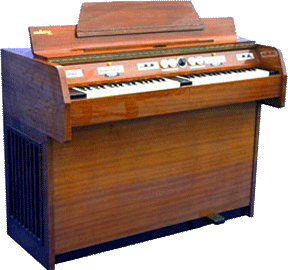
It was however, the Mellotron that Mike Pinder played on the Moodie's ground-breaking 1967 concept album "Days Of Future Passed" that he used to create the perfect atmosphere for exploration of both inner and outer space imagined in the mind of the listener. This album set the standard for subsequent Moody Blues LPs and the Mike Pinder composition 'Dawn Is A Feeling' provided the perfect book-end to Justin Hayward's classic 'Nights In White Satin'. Graeme Edge wrote the poem 'Late Lament' that was read by Mike Pinder on the album. Graeme recalled; "They sort of sidled up to me and said, 'You know, it's great, but it's a bit better with Mike's voice.' Like I was going to get upset! I was absolutely thrilled to have something I wrote on the album."
Mike Pinder recorded ten top-selling albums with the Moody Blues, from 1965's "Magnificent Moodies" to "Octave" in 1978 during which time he composed some of their most compelling music. He'd formed an early songwriting partnership with Denny Laine that produced more than a dozen original songs recorded by the band, but following Denny's departure, Mike was pivotal in getting Justin Hayward into the group as his replacement.
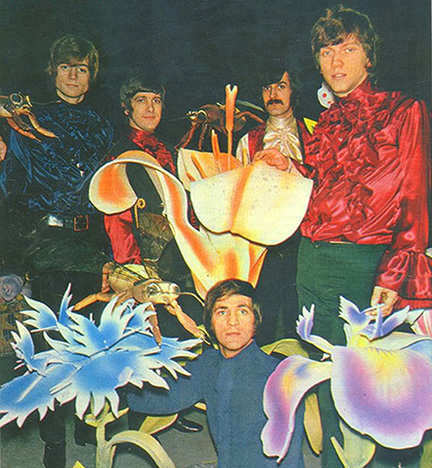
While Justin and John Lodge became the main songwriters in terms of radio-friendly hit singles, Mike's more "progressive" compositions explored deep spiritual, social, and scientific themes as influenced by his passion for Eastern philosophy and meditation on his continuing journey of self discovery (the group photo shows the second Moody Blues line-up Left to Right; Justin Hayward, Graeme Edge, Mike Pinder, Ray Thomas, John Lodge).
When creating songs and music for "Days of Future Passed" and later albums, Mike said; "If someone had a song that was almost ready, for instance 'Twilight Time' that Ray Thomas had written. Ray didn't play piano or guitar but was good with melodies so he would sit down with me at the piano and sing while I would work out the chords and arrangement for it. That happened a lot and everyone would kick in something for it at some point."
Mike's own songwriting contributions for the Moody Blues included; 'Love And Beauty' (the first Moody Blues record on which he played Mellotron); 'Dawn Is A Feeling' and 'The Sunset' (from "Days of Future Passed"); 'The Best Way To Travel' and 'Om' (from "In Search of The Lost Chord"); 'So Deep Within You', 'Have You Heard', 'The Voyage' (from "On The Threshold of a Dream"); 'Out And In', 'Sun Is Still Shining' (from "To Our Children's Children's Children"); 'How Is It We Are Here', 'Melancholy Man' (from "A Question of Balance"); 'My Song' (from "Every Good Boy Deserves Favour"); 'Lost In A Lost World', and 'When You're A Free Man' (from "Seventh Sojourn").
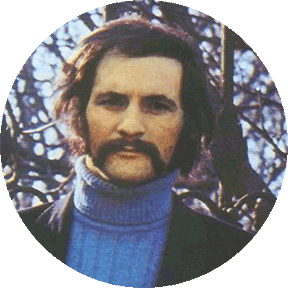
The subject of mind-altering drugs is sometimes mentioned when discussing the music of the Moody Blues. It was after all, the "psychedelic era" and the Moodies gained a large following of fans, some of whom regarded them as "the ultimate cosmic philosophers". The band did experiment (with the exception of John Lodge apparently!) as per their Ray Thomas song 'Legend Of A Mind' (Timothy Leary) and regarding LSD use at the time, Mike Pinder said; "It works in terms of if you were an artist you would end up with more pastels or colour varieties because you would notice the subtle differences. It's the same with listening to music in that you enjoy it most when you're in a meditative state and so I think the drug influence was able to put you into that state instantly."
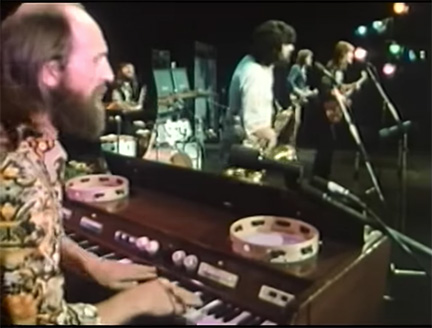
Following years of worldwide success recording and touring, including the establishment of their own "Threshold" records label, the group decided to take a much-needed break from each other and work on solo projects after the release and promotion of their 1972 album "Seventh Sojourn". Mike Pinder relocated to the USA and purchased a large rural property in California near Malibu that he named "Indigo Ranch" where he built his own recording studio. With the help of local musicians, Mike recorded his own album titled "The Promise" that included unused music he had originally composed for the Moody Blues.
To this day, there's still controversy as to why Mike Pinder left the Moody Blues. During 1977, the band decided to re-unite and record tracks for what became their "Octave" album but Mike was unwilling to return to the UK. He said; "Our record producer Tony Clarke came over to visit me and said 'How about putting a new album together?' I said that's fine but I can't go back to England because the immigration service have lost my papers. My son Daniel from my first marriage who was only three at the time was with me, and if I'd left the country I wouldn't have been able to get back into the USA. I said I'd be available if the guys wanted to come over and record in America, so Tony went back and told them. I found out later the message they got was something like, 'Mike doesn't want to come to England, he wants you to come to him' which of course was a very arrogant statement and totally untrue."
Justin Hayward was the first to visit Mike Pinder with the idea of them recording together in Mike's home studio, but when the rest of the band showed up later, the mood soon deteriorated. Mike recalled; "When they did come over, there was a lot of unsaid misunderstandings and feelings swimming about during those recording sessions. It got so overwhelming. It was like 'I don't think I'm having fun anymore". Sadly, during one particular moment of tension, Mike had a falling-out with drummer Graeme Edge with whom he'd been friends since the very early days of the Moody Blues. This was something he always regretted.
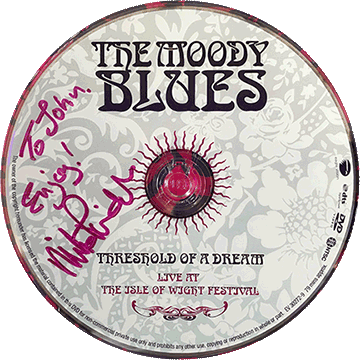
Mike Pinder contributed only one new song titled 'One Step Into The Light' to the recording sessions. The record company of course, wanted the band to go on a lengthy tour following the completion and release of the new Moody Blues album. This was something Mike Pinder was unwilling to do after having just met his new wife (Mike's first marriage had ended in divorce and he'd moved permanently to the United States by the mid 1970s). The tour went ahead anyway and Mike was replaced in the band by Swiss keyboardist Patrick Moraz who'd previously played in the famous progressive rock group YES.
In the years following his departure from the Moody Blues, Mike Pinder gave few interviews and kept a low profile for the next decade while dedicating his time to raising a family in the USA with his American born wife Tara Lee with whom he had two more sons Matt and Michael. Mike later went on to take a consulting position at the Atari Computer Corporation where he assisted in development of their synthesized sound technology.

While not completely giving up his music career, Mike Pinder continued to write songs and recorded a new album titled "Among The Stars" that was issued to positive response in 1994. He also made a number of popular children's records on which he narrated stories and supplied the sound track. The first of these "A Planet With One Mind" was issued in 1995 and this was followed by "A People With One Heart" the following year.
In more recent years, Mike assisted his sons in establishing their own careers in music. His eldest son Daniel became a Hollywood film music editor and has earned many credits including "Pirates of The Caribbean" and "The Da Vinci Code". His other two sons Matt and Michael Lee are both professional musicians who perform together as "The Pinder Brothers".
The Moody Blues were belatedly inducted into the famous "Rock 'n' Roll Hall of Fame" in 2018 by which time former group members Clint Warwick and Ray Thomas had passed away. Of the event, Mike Pinder said; "The rock hall people were wonderful. The ceremony was too long and the sound too loud for the room but there were moments of great interest. For the Moody families it was the opportunity to share in several days of love, past memories and making new memories for our families. All the band brought their children and grandchildren and that was magic. I am happy that we finally got inducted for our fans sake. As I have said for the last 30 years "the fans are my hall of fame."

The family of Mike Pinder released this statement following Mike's passing.
In Honor of our beloved Mellotron Man, Mike Pinder (Musician, Father, Cosmic Philosopher and Friend):
"Michael Thomas Pinder died on Wednesday, April 24th, 2024 at his home in Northern California, surrounded by his devoted family. Michael's family would like to share with his trusted friends and caring fans that he passed peacefully. His final days were filled with music, encircled by the love of his family. Michael lived his life with a childlike wonder, walking a deeply introspective path which fused the mind and the heart."
"He created his music and the message he shared with the world from this spiritually grounded place; as he always said, "Keep your head above the clouds, but keep your feet on the ground." His authentic essence lifted up everyone who came into contact with him. His lyrics, philosophy, and vision of humanity and our place in the cosmos will touch generations to come."
This is a tough choice but I'm posting below some of my favorite Mike Pinder moments with the Moody Blues. Rest In Peace Mike. JRW